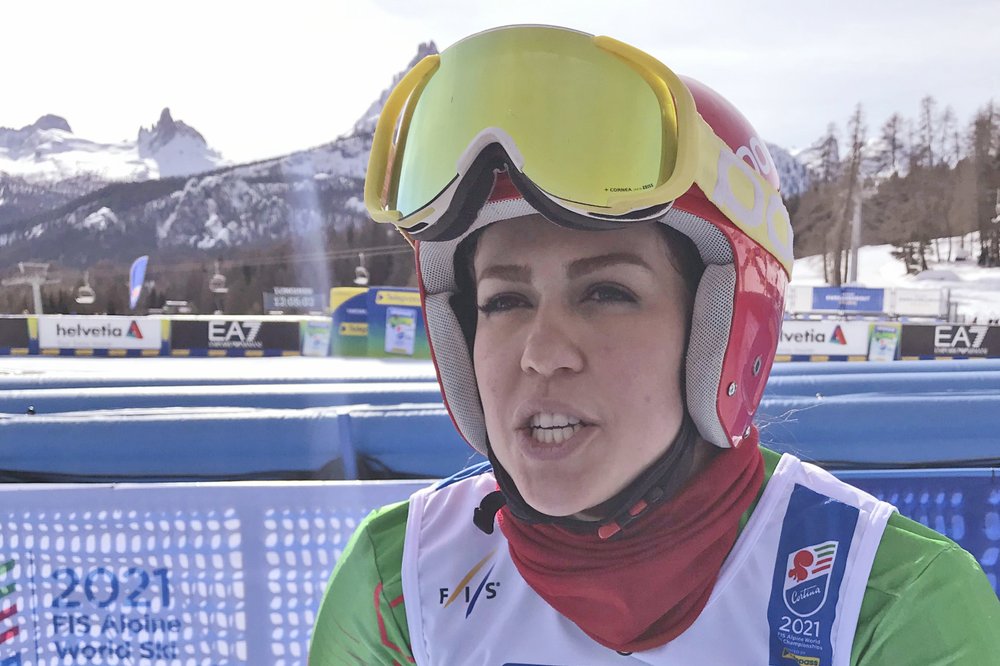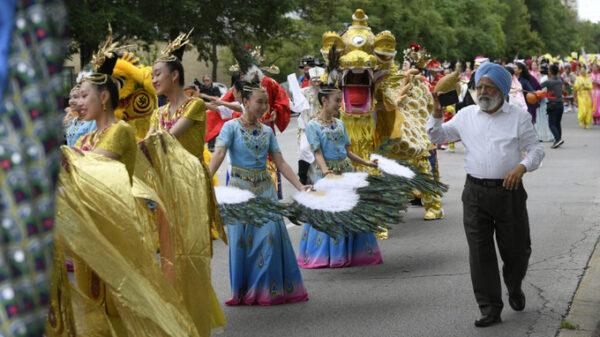Iran’s Forough Abbasi is interviewed in the finish area after the first run of a women’s giant slalom, at the alpine ski World Championships, in Cortina d’Ampezzo, Italy, Thursday, Feb. 18, 2021. (AP Photo/Andrew Dampf)
CORTINA D’AMPEZZO, Italy (AP) — Iranian skier Forough Abbasi accomplished one goal Thursday merely by completing her giant slalom run at the skiing world championships.
It made no difference to her that she crossed the finish line nearly 25 seconds behind American favorite Mikaela Shiffrin, the first-run leader.
Still, Abbasi was just getting started.
The 27-year-old Abbasi then made an emotional appeal for women’s rights in her country after her coach, Samira Zargari, was banned from leaving Iran by her husband.
Under Iranian law, husbands can stop their wives from traveling outside of country.
“It’s not the first time,” Abbasi said. “We had the same problem before this. But I wish we can change it — all the women in Iran, all together, I wish we could change it. We are trying. I’m sure the strong women can for sure change these rules and she will be stronger than before. We are proud of her, really.”
Abbasi said Zargari’s husband was born in the United States and grew up there but is a Turkish national.
“He just lives in Iran like five-six years,” Abbasi said. “He just knows the rules in Iran.”
Abbasi said her coach is a “really a strong woman” and that she’s “sure she can be more stronger from that.”
Zargari is not the first married athlete whose husband prevented her from leaving Iran. In 2015, soccer player Niloufar Ardalan missed the Asian Cup tournament in futsal — an indoor version of soccer — after her husband confiscated her passport in a domestic dispute.
Women’s sports largely disappeared from Iran after the country’s 1979 Islamic Revolution. Over time, however, they gained in popularity, especially soccer. Social customs still come into the game, though, as the country’s soccer team plays its matches with players’ hair covered by traditional headscarves, or hijabs.
Two Islamic countries make the headscarf mandatory for women in public — Iran and Saudi Arabia. FIFA overturned a yearlong ban against players wearing hijabs in 2012.
Abbasi — one of eight Iranians (four women and four men) competing in Cortina — said she is free to drive, travel, train and race in Iran.
“Everything is free to us,” she said. “There is some rules like this but it’s not for everyone. In Iran maybe in a 1,000 women, one of them has a problem. … Even my coach. She’s really a free woman. She was all over the world. She’s traveling all the time. This time this happened. … But for sure it will be changed.”
Still, Abbasi said the government prevents her from taking on certain jobs and that she has to work as a ski instructor to support her skiing career.
“I really want to stay in Iran and change the rules — change something that is stopping athletes, not just women,” she said. “The boys can’t buy equipment. It’s the same for everyone.”
Copyright 2020 Associated Press. All rights reserved.
Source: https://apnews.com/article/womens-rights-iran-sports-europe-skiing-91a82f9a38a271eabc6abdd270720a17





























